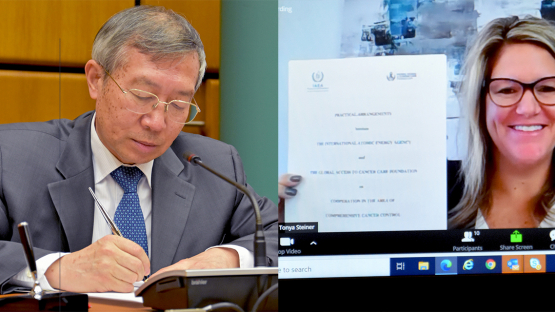There is an estimated shortage of 50,000 cancer care professionals in the developing world and the IAEA is joining forces with the Global Access to Cancer Care Foundation (GACCF) to help authorities in low and middle income countries train professionals in cancer care over the next years. A partnership between the two organizations, signed yesterday, aims in particular to improve professional skills to provide quality cancer care for women and children.
The IAEA and the GACCF will collaborate to educate cancer care professionals in radiation therapy and nuclear medicine through training courses and on-location teaching to practitioners in health facilities. The partners will also work to mobilize resources to support countries in the establishment of nuclear and radiation medicine services and raise awareness of the unequal access to cancer services in LMICs.
Most LMICs do not have the resources to meet the growing staffing needs in radiotherapy and sometimes face difficulties in sustaining their cancer care workforce due to the lack of effective retention schemes. Through training courses which also include e-learning materials, the IAEA and GACCF will work to help remedy these shortcomings.
Both organizations provide training to the staff of treatment centres across the developing world. By joining forces, they can harmonize and more easily scale up these activities.
“This new partnership will not only support the work the IAEA is already doing in terms of enhancing training for cancer care professionals worldwide, but it also represents a new way of engaging with global partners like foundations and the private sector to accelerate the adoption of latest know-how on how to use nuclear technologies to effectively and sustainably offer cancer treatment to much larger numbers of patients in developing countries,” said IAEA Deputy Director General Dazhu Yang.
“GACCF is on the front lines providing life-saving cancer treatment education for medical specialists and creating access to radiotherapy treatments throughout the developing world. Together with the IAEA we will be able to provide cancer care professionals with the education and tools they need to save lives," said Tonya Steiner, Executive Director and CEO of GACCF.
GACCF is a United States-based global non-profit organization organization that works with an expansive network of industry businesses and academia to provide oncology education programmes in LMICs. It organizes and coordinates networks of cancer care professionals including doctors, nurses, medical physicists, dosimetrists and radiotherapy technicians, who implement and oversee workshops and training events in radiation oncology and related high-level physics.
The IAEA supports countries in the use of nuclear and radiation medicine to fight a growing incidence of chronic diseases, such as cancer. It plays a vital role in the training and maintenance of the health workforce in LMICs. Through its technical cooperation programme, the IAEA provides short- and long-term fellowships as well as full academic and clinical training to medical professionals.
“Cancer is global problem that requires a global response,” said Lisa Stevens, Director of the IAEA’s Programme of Action for Cancer Therapy. “This collaboration will strengthen our efforts to mobilize the resources needed to invest in high quality training for cancer care professionals in developing countries.”






